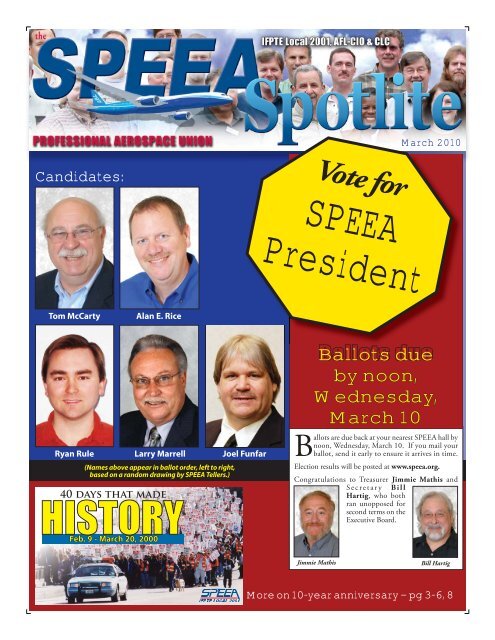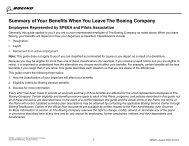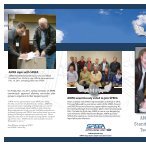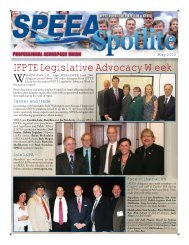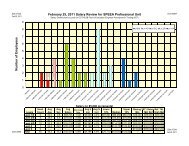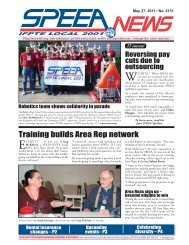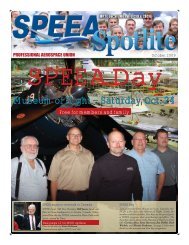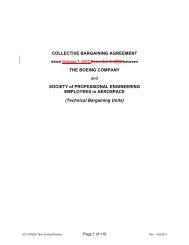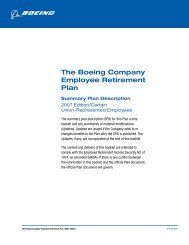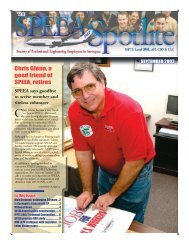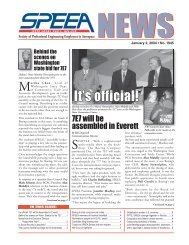March 2010 - Speea
March 2010 - Speea
March 2010 - Speea
You also want an ePaper? Increase the reach of your titles
YUMPU automatically turns print PDFs into web optimized ePapers that Google loves.
<strong>March</strong> <strong>2010</strong><br />
Candidates:<br />
Vote for<br />
SPEEA<br />
President<br />
Tom McCarty<br />
Alan E. Rice<br />
Ryan Rule Larry Marrell Joel Funfar<br />
(Names above appear in ballot order, left to right,<br />
based on a random drawing by SPEEA Tellers.)<br />
40 days that made<br />
Ballots due<br />
by noon,<br />
Wednesday,<br />
<strong>March</strong> 10<br />
Ballots are due back at your nearest SPEEA hall by<br />
noon, Wednesday, <strong>March</strong> 10. If you mail your<br />
ballot, send it early to ensure it arrives in time.<br />
Election results will be posted at www.speea.org.<br />
Congratulations to Treasurer Jimmie Mathis and<br />
Secretary Bill<br />
Hartig, who both<br />
ran unopposed for<br />
second terms on the<br />
Executive Board.<br />
Feb. 9 - <strong>March</strong> 20, 2000<br />
Jimmie Mathis<br />
Bill Hartig<br />
More on 10-year anniversary – pg 3-6, 8
President<br />
Cynthia Cole<br />
Executive Director<br />
Ray Goforth<br />
Democracy in action<br />
at Council meetings<br />
Council Representatives meet monthly in the<br />
Puget Sound and Wichita to discuss SPEEArelated<br />
issues, vote on motions and share reports<br />
such as ‘Good of the Union.’ Shown above are<br />
members at the Northwest Council Guest Night.<br />
About 40 guests joined their district Council<br />
Rep for this annual event. At right, are Wichita<br />
Council Reps at their monthly meeting.<br />
Spirit outsources 135 more in IT<br />
Spirit AeroSystems announced plans to<br />
outsource 135 Information Technology<br />
(IT) jobs as of April 2. About 60% of the<br />
outsourcing notices went to SPEEA-represented<br />
employees.<br />
SPEEA officials immediately began reviewing<br />
and checking information to ensure Spirit<br />
AeroSystems is following all procedures and<br />
contract requirements. SPEEA is also planning<br />
workplace meetings to keep represented employees<br />
informed.<br />
“We are doing everything we can to ensure processes<br />
are followed and the best options are available<br />
for our represented employees,” said Bob<br />
Brewer, SPEEA Midwest director.<br />
Options for those facing layoff include applying<br />
for a job with the vendor receiving the work,<br />
being offered a new job at Spirit, or, if eligible,<br />
applying for the early retirement buyout offered<br />
by Spirit.<br />
The layoff list provided by Spirit includes 83<br />
SPEEA-represented employees. Of those, 70<br />
are in the Wichita Technical and Professional<br />
Unit (WTPU) and the<br />
rest are in the Wichita<br />
Engineering Unit<br />
(WEU).<br />
In addition to SPEEArepresented<br />
employees,<br />
those also targeted for<br />
outsourcing are contract<br />
workers, nonrepresented<br />
employees<br />
and management.<br />
BCBS of Kansas<br />
Reminder<br />
IFPTE scholarship<br />
applications<br />
Due <strong>March</strong> 15<br />
See www.ifpte.org for details<br />
The outsourcing is part of a Spirit restructuring<br />
effort that will send IT work packages to vendors<br />
IBM and HP.<br />
A total of 37 employees were outsourced Oct.<br />
30 in the first phase.<br />
System error triggers<br />
claims reprocessing<br />
WICHITA - Kansas Blue Cross & Blue<br />
Shield (BCBS) reworked about 1,500<br />
Boeing employee medical claims in<br />
February because some claims were improperly<br />
processed as non-network claims.<br />
BCBS of Kansas confirmed a systems error<br />
caused some in-network claims to be denied or<br />
processed at the lower non-network benefit after<br />
a member raised questions about a recent bill.<br />
Although SPEEA<br />
doesn’t know how<br />
many were affected in<br />
the bargaining unit, all<br />
employees are advised<br />
to review medical billing<br />
statements and<br />
contact Boeing benefits<br />
with questions or<br />
concerns.<br />
Executive Board<br />
Jimmie Mathis<br />
Bill Hartig<br />
Walt Ditlefsen<br />
Larry Marrell<br />
Ryan Rule<br />
Earl Carter<br />
SPEEA Council Officers<br />
Joel Funfar<br />
Renee Jarvi<br />
Rebekah Arnold<br />
Treasurer<br />
Secretary<br />
NW Regional VP<br />
NW Regional VP<br />
NW Regional VP<br />
MW Regional VP<br />
Chair<br />
Treasurer<br />
Secretary<br />
Midwest Regional Council Officers<br />
Debbie Logsdon<br />
Chair<br />
R. Matthew Joyce Treasurer<br />
Brenda Reiling<br />
Secretary<br />
Northwest Regional Council Officers<br />
Roger Pullman<br />
Chair<br />
Michael Hochberg<br />
Treasurer<br />
Carrie Rule<br />
Secretary<br />
SPEEA Publications<br />
Bill Dugovich Communications Director<br />
Lori Dupuis Graphic/Web Designer<br />
Rich Kremnetz Printing/Mail Manager<br />
Karen McLean Publications Editor<br />
speea_info@speea.org<br />
www.speea.org<br />
SEATTLE HALL<br />
15205 52nd Ave S • Seattle, WA 98188<br />
M-Th, 8 am to 6 pm • Fri, 8 am to 4:30 pm<br />
Phone: (206) 433-0991<br />
EVERETT HALL<br />
2414 106th Street SW<br />
Everett, WA 98204<br />
M-F, 8 am to 4:30 pm<br />
Phone: (425) 355-2883<br />
WICHITA HALL<br />
973 S Glendale St • Wichita, KS 67218<br />
M-Th, 8:30 am to 5 pm • Fri, 8 am to 4:30 pm<br />
Phone: (316) 682-0262<br />
2 SPEEA SPOTLITEMARCH <strong>2010</strong>
President’s Corner<br />
By Cynthia Cole, SPEEA President<br />
40 days on the line for future generations<br />
This month, we mark the 10-year anniversary<br />
of the end of the SPEEA 40-day<br />
strike (Feb. 9 – <strong>March</strong> 20, 2000). This<br />
marked a turning point in my involvement with<br />
our union.<br />
I became a dues-paying member the moment I<br />
was hired by The Boeing Company. My previous<br />
experiences at a competing aerospace employer,<br />
where the engineering workforce was not protected<br />
by a union, had taught me enough to<br />
know I wanted to join SPEEA. By February<br />
2000, I had been an engineer with nearly 22<br />
years of experience. Even so, I did not know<br />
much about SPEEA’s inner workings.<br />
As the negotiations heated up (our first since<br />
the Boeing - McDonnell Douglas merger), I<br />
attended lunchtime meetings and rallies after<br />
work. While I was clear about voting down the<br />
contract, I remember being conflicted about the<br />
strike vote. We had never done this before. We<br />
would put a lot on the line, if we walked off<br />
our jobs.<br />
One thing I was sure of - if we did approve a<br />
strike - I was going to join my colleagues on<br />
the picket line and stay out until we all walked<br />
back in.<br />
Battle for respect<br />
The results of the vote will go down in history<br />
as an event that changed the course of SPEEA.<br />
Yes, we turned down a disrespectful contract.<br />
More than that, however, the engineering workforce<br />
disagreed with the direction corporate was<br />
taking the company. Wanting to retain a key<br />
attribute of Boeing’s success—a focus on solid<br />
engineering decisions — made the difference<br />
in how a logic-driven workforce voted. Feb. 9<br />
came. Droves of SPEEA-represented employees<br />
walked out together. I went to the rally in Renton<br />
and volunteered to be a picket captain at the<br />
Developmental Center. The battle for respect<br />
began.<br />
published monthly by:<br />
Society of Professional Engineering Employees in Aerospace, IFPTE Local 2001, AFL-CIO, CLC<br />
15205 52nd Ave S • Seattle, WA 98188 • (206) 433-0991<br />
Volume 52, Number 3; MARCH <strong>2010</strong><br />
ISSN 0194-8687<br />
Subscription rate: $2.00 per year<br />
$2.00 of the annual membership dues is paid as a year’s<br />
subscription to the SPEEA SPOTLITE.<br />
Much camaraderie emerged during those long<br />
hours out on the picket line. We had many problem-solving<br />
conversations. Our spirits were<br />
lifted by free coffee from Randy’s restaurant,<br />
horns blowing in support, and by keeping in<br />
touch with the other Boeing sites via e-mail.<br />
Reading their stories, it was almost as if I had<br />
been there.<br />
One particularly dark, cold morning, a manager<br />
from the Joint Strike Fighter Program who<br />
had never been a union member, came out to<br />
where I was standing and said “beat them.” I<br />
knew then we were out there on the picket line<br />
not just for ourselves, but for the other Boeing<br />
employees who could not join us, yet felt the<br />
same as we did. We were fighting to keep<br />
alive the spirit of technical integrity within a<br />
company for which we had all invested years<br />
of our lives.<br />
‘Best-engineered’<br />
I still have the Seattle Times newspaper clipping<br />
citing Richard Trumka, then AFL-CIO<br />
secretary-treasurer, as saying, “This is the bestengineered<br />
picket line I’ve seen.” This sums<br />
up what we were doing out there. Engineers<br />
and technicians strive to find the right way to<br />
perform any job. Since we decided to go out<br />
on strike, we might as well apply our creative<br />
abilities and do the best job possible.<br />
Lessons learned<br />
• First: If we were not willing to take a<br />
stand for our convictions, no one else was<br />
going to do it for us.<br />
• Second: Each day, we focused on what<br />
was going well and kept pressing on<br />
toward the mark. Each day, our objective<br />
on the strike line was “one day longer<br />
than management.” This short-term target<br />
kept us on track toward the ultimate<br />
goal.<br />
• Third: When we achieved our goal, we<br />
went back in without rancor for those<br />
who did not join us. We demonstrated<br />
what we wanted to see - respect.<br />
Local 2001, AFL-CIO, CLC<br />
3 SPEEA SPOTLITEMARCH <strong>2010</strong><br />
Why it matters today<br />
More and more, the SPEEA membership will<br />
consist of people who were not in the bargaining<br />
units in 2000. If you were not, talk to some<br />
of your coworkers who were. Find out what it<br />
meant to them. Most will say SPEEA is our collective<br />
voice for holding management accountable<br />
to contractual agreements offering respectful<br />
wages, benefits and working conditions.<br />
In the past 10 years, Boeing sold off many of<br />
the places where our members work. More<br />
and more, corporate decisions are justified by<br />
“shareholder value” that glosses over the effects<br />
of compromising technical integrity. Is “compromise”<br />
too strong a word? No! By outsourcing our<br />
jobs and competencies (almost always to nonrepresented<br />
workforces) without our input, we<br />
have observed unprecedented snafus and delays<br />
across the board.<br />
Without the collective voice of peers to back them,<br />
employees tend to keep their heads down, rather<br />
than say “no” to management-directed shortcuts<br />
that can sacrifice technical integrity. Before the<br />
culture shift at Boeing corporate, and executives’<br />
subsequent exodus to Chicago, we never had a<br />
time when so many major programs were simultaneously<br />
behind schedule and over budget!<br />
To maintain technical integrity, we will follow<br />
the work and expand into other aerospace arenas.<br />
As we do so, outsourcing and relocating<br />
will no longer be the way for corporations to<br />
avoid accountability for the long-term impact<br />
of their decisions.<br />
Index Page<br />
Spirit outsources 135 more in IT .................................. p2<br />
System error triggers claims reprocessing ...................... p2<br />
We were ready ‘for as long as it takes’ ............................ p4<br />
Gains from 40 days on the line ...................................... p4<br />
A cherished memory of the SPEEA strike ........................ p5<br />
Quotes from the Daily Picketeer newsletter .................. p5<br />
40 days that made history timeline ............................... p6<br />
A coming of age: SPEEA’s 40 days on the line ................. p6<br />
Boeing to move core engineering .................................. p7<br />
Our message in 2000 still makes sense today ................. p8<br />
Periodicals Postage Paid<br />
at Seattle, Washington<br />
Reproduction rights reserved. No part of this publication may be<br />
reproduced without permission of the editor. When permission is<br />
granted, material must be used in context and credit given to the<br />
SPEEA SPOTLITE.<br />
Original articles and feedback are solicited.<br />
POSTMASTER: Address changes to The SPEEA SPOTLITE
40 DAYS THAT M<br />
With a slogan of ‘No Nerds, No Birds,’<br />
about 85% of the SPEEA Prof and<br />
Tech bargaining units went on strike<br />
from Feb. 9 to <strong>March</strong> 20, 2000. The strike came<br />
after members rejected two contract offers (Dec.<br />
1 and Feb. 2).<br />
Although membership<br />
grew by almost<br />
5,200 between<br />
Aug. 1, 1999 and<br />
the strike, about<br />
5,000 engineers and<br />
techs at The Boeing<br />
Company were not<br />
members when they<br />
walked off the job.<br />
About 70 picket sites<br />
We were ready for ‘as long as it takes’<br />
By Craig Buckham<br />
(Editor’s note: Craig Buckham was SPEEA president during the strike of 2000).<br />
went up around the Puget Sound, Spokane, and<br />
six other states. Support poured in from IFPTE,<br />
the AFL-CIO, and countless other unions, nonunion<br />
workers and even managers at Boeing as<br />
well.<br />
Within weeks, a strike<br />
relief fund grew to<br />
about $300,000.<br />
About 3,800 members<br />
tapped into the<br />
fund to help them<br />
hold out ‘one day<br />
longer.’<br />
A truckload of onions was<br />
donated to the SPEEA food<br />
banks during the strike.<br />
The week before the second contract vote (Feb. 2, 2000), former SPEEA Executive<br />
Director Charlie Bofferding and I found ourselves sitting in AFL-CIO headquarters<br />
in Washington, D.C., meeting with the leaders of the largest international unions. We<br />
had traveled there to solicit advice and support for what we believed to be an inevitable strike.<br />
In a fifth-floor conference room overlooking the White House, we heard from the experts –<br />
including mine workers, Teamsters, machinists, and AFL-CIO top dogs John Sweeney and<br />
Richard Trumka. One after another, they said “you are not ready.” To a one, they advised us<br />
to wait, to stall, and to engage with our membership to build enthusiasm.<br />
Charlie and I both argued we were much more “ready” than they thought we were, and that we<br />
had no real alternatives to a strike. But we did not convince the experts. The AFL-CIO leaders<br />
continued to say, over and over, “it is easy to start a strike; it is very difficult to end one. You<br />
are not ready.”<br />
The union leaders wished us well, promising solidarity of spirit, but stopping well short of<br />
promising money and manpower.<br />
While returning to Seattle, we discussed strategies to elevate our membership’s spirit over the<br />
threshold necessary to conduct a successful strike. When we arrived, however, it appeared that our<br />
ideas had been overtaken by events. The Negotiating Teams, Council, staff and most everyone in<br />
the workplace were all highly energized. Ultimately, the refusal of the Boeing negotiators to budge<br />
at all proved to be the only spirit-raising strategy necessary. We had our vote, and ready or not…<br />
We marched out at 9 a.m., Feb. 9, together, 19,000 strong. Our early and overwhelming participation<br />
and solidarity surprised the labor community as much as it surprised the Boeing leaders.<br />
I believe that we surprised ourselves quite a bit as well. Our pre-strike polling had indicated most<br />
people were willing to strike for one or two weeks, with fewer answering “as long as it takes.”<br />
That turned out to be longer than many of us expected, but we achieved what we needed – no<br />
takeaways – and a bit more.<br />
Now, 10 years later, among many challenges, we see a growing Boeing effort to move operations<br />
to supposedly cheaper environments. I know this is a bad idea. Boeing is much more that just<br />
a brand owned by the shareholders, conscripting the low-bid workforce in far-flung regions.<br />
Boeing is a community of employees, dedicated to the quality of our products, committed to<br />
the success of our customers and to the safety of their passengers. It does very much matter what<br />
we do, who does it, and where we do it. It is dangerous for the company leaders to think that<br />
they can shop around for a replacement workforce and a replacement supporting community.<br />
I truly hope that we do not need to engage in another strike to prove our value, but if we do,<br />
I am confident we will be ready.<br />
Gains from 40<br />
days on the line<br />
• Stopped “Total Comp” takeaways<br />
• Secured wage increases each year<br />
• Maintained medical benefits<br />
• Achieved a bonus - $2,500<br />
• Improved retirement benefit<br />
• Ended mandatory weekend work<br />
• Protected early retiree medical benefit<br />
• Secured a vote on “Fair Share” dues<br />
(approved by vote of all bargaining<br />
units’ employees)<br />
• Built solidarity among members<br />
• Established SPEEA as part of the labor<br />
community<br />
• Gained national and international<br />
recognition for SPEEA and IFPTE<br />
• Established a “partnership” with the<br />
company<br />
• R-E-S-P-E-C-T<br />
4 SPEEA SPOTLITEMARCH <strong>2010</strong>
ADE HISTORY<br />
A cherished memory<br />
of the SPEEA strike<br />
By Greg Junemann<br />
IFPTE president<br />
When I think back to the SPEEA strike,<br />
I recall countless memories involving<br />
thousands of wonderful people<br />
who showed their best stuff when called upon<br />
to do so.<br />
But one memory, one incident in particular,<br />
sticks out in my mind. It’s a memory I haven’t<br />
shared with very many people.<br />
After the two bargaining<br />
teams settled on<br />
tentative agreements,<br />
we held a series of<br />
meetings to discuss<br />
the aspects of the final<br />
proposals in three separate<br />
open forums with<br />
the members. Emotions<br />
were running very high<br />
as people wanted to<br />
understand whether<br />
the risks they had just<br />
undergone over the<br />
previous months had<br />
been worth their troubles;<br />
whether all of their efforts had indeed paid<br />
off. To put it plainly, a lot of people were still<br />
extremely angry, and they weren’t in the mood<br />
to settle for anything less than justice.<br />
After the first meeting had concluded at Seattle’s<br />
South Center, and large groups of people were<br />
milling about, I found myself pulled to the side<br />
of a back hallway.<br />
From somewhere, a man approached me. I’d seen<br />
him before at rallies and marches, and on picket<br />
lines, but I never got his name. He was a tough<br />
looking sort. He had a full, black beard, and<br />
somewhat shaggy hair. He was barrel-chested and<br />
wore a thick leather jacket. As he stepped toward<br />
me, I could see the rather angry scowl on his face,<br />
and I set myself for whatever he had in mind.<br />
“Do you really think this is good settlement?”<br />
IFPTE President Greg Junemann (above left) supported<br />
SPEEA’s picket lines along with countless other unions. Also<br />
shown above: Joe McGee, executive director of IFPTE Local 17.<br />
he said in a challenging tone.<br />
“Yes, I really do,” I replied, set to repeat some of<br />
the lines I’d used moments earlier in addressing<br />
the audience of members.<br />
He stared at me steadily, and I thought he was<br />
about to throw a punch.<br />
“And you think this is going to pass?” he<br />
demanded.<br />
“Yes, I do,” I replied, as I watched him. “Not<br />
only that, I think it<br />
should pass. This is a<br />
terrific contract.”<br />
Then, all at once,<br />
the man’s demeanor<br />
changed, and his<br />
expression softened.<br />
“It’s gotta pass!” he<br />
exclaimed in desperation,<br />
as he stepped<br />
toward me. Then, he<br />
looked directly into<br />
my eyes, and threw his<br />
arms around my shoulders,<br />
and hugged me.<br />
“I can’t take this anymore!” he sobbed as he<br />
embraced me.<br />
I don’t recall exactly what I said, except that I<br />
kept trying to reassure him things would be OK.<br />
Yet, rather than releasing his embrace, the man<br />
hugged me even tighter, and wept openly for<br />
several minutes. He had completely lost control<br />
of his emotions, and he didn’t seem to care who<br />
was witnessing his actions.<br />
Finally, he found the strength to regain his composure.<br />
He mumbled a few words of thanks, turned<br />
his back, and walked away. I haven’t seen him since.<br />
That man’s raw emotion encompassed the entire<br />
strike for me. People were outraged and furious<br />
because of the disrespectful way their employer<br />
had treated them. Then, those same people were<br />
filled with immense pride as they stood shoulder<br />
Quotes from the Daily<br />
Picketeer newsletter<br />
• “People who were used to working<br />
their best in isolation came out of<br />
their shells and brought their discontent,<br />
their dissatisfaction, together<br />
into a unity that was beautiful to<br />
behold. We began to function as an<br />
entity with self-respect, unity and<br />
common purpose. We became a new<br />
SPEEA.” Daily Picketeer, <strong>March</strong> 1.<br />
• “If only Boeing could harness the spirit<br />
that is out there on the picket line, it<br />
would be an awesome company. If they<br />
can’t see the importance of teamwork<br />
from top to bottom, they have to be<br />
blind.” Daily Picketeer, <strong>March</strong> 10.<br />
• “I never thought I’d see the day when<br />
The Boeing Company would tell its<br />
engineers and technicians to go take a<br />
flying leap.” Daily Picketeer, Feb. 15.<br />
• “The SPEEA strike is different because<br />
it is powered and driven, not by professional<br />
union officials as is usual, but<br />
by the workers. This is a strike that has<br />
been driven by membership demand.”<br />
- Mike Sells, secretary-treasurer of<br />
Snohomish County Labor Council, The<br />
Everett Herald (noted in Daily Picketeer<br />
<strong>March</strong> 14)<br />
to shoulder with one another in countless acts<br />
of defiance and kinship.<br />
Still, those people had to live with the daily<br />
fear and apprehension that their heroic tasks<br />
might well come to nothing more than a huge<br />
loss – one that might devastate their families.<br />
So, when those people – those phenomenal<br />
people – saw that they would prevail in their<br />
struggle, their emotions poured out, as had<br />
happened with my union brother at South<br />
Center.<br />
That’s a memory worth cherishing.<br />
5 SPEEA SPOTLITEMARCH <strong>2010</strong>
40 DAYS THAT MADE HISTORY Labor History<br />
A coming of age:<br />
SPEEA’s 40 days<br />
on the line<br />
By Ross K. Rieder, president<br />
Pacific NW Labor History Association<br />
SPEEA took its picket line to the Boeing Board of Directors’ meeting at the Four Seasons Hotel, Seattle.<br />
• Oct. 25, 1999 - Prof and Tech Main Table<br />
“formal” negotiations began.<br />
• Dec. 1 - Members rejected offer (Profs-<br />
97.8% and Techs - 98.7%). Members voted<br />
for strike authorization (Profs-78.7% and<br />
Techs-85.8%).<br />
• Dec. 6 - Wichita Engineering Unit (WEU)<br />
members voted 99% to reject (84% for strike<br />
authorization).<br />
• Feb. 2 - Members voted to reject second offer<br />
(Profs-51% and Techs-62%).<br />
• Feb. 3 - Both sides went back to negotiations.<br />
• Feb. 6 - SPEEA filed<br />
Unfair Labor Practice<br />
(ULP) charges against<br />
Boeing - alleging<br />
Boeing was revoking<br />
approved vacations<br />
and threatening to fire<br />
workers who walked<br />
off the job.<br />
• Feb. 7 - SPEEA and<br />
Boeing negotiators<br />
met.<br />
• Feb. 8 - Company pulled offer and walked out.<br />
• Feb. 9 - At 9 a.m., more than 19,000 walk<br />
off the job in protest. Factory workers and<br />
non-union workers stood up and applauded.<br />
More than 10,000 assemble at Renton<br />
Memorial Stadium for kick-off rally.<br />
• Feb. 11 - First airplane delivery delayed,<br />
SPEEA reported. Presidential candidate<br />
Bill Bradley visited SPEEA picket lines in<br />
Everett and Seattle.<br />
• Feb. 20 - SPEEA hosted pancake breakfast for<br />
hundreds at Tukwila Community Center -<br />
raised more than $4,800 for Striker Relief Fund.<br />
• Feb. 23 - More than 2,500 SPEEA members<br />
and others marched to corporate offices in<br />
Seattle from the IAM hall.<br />
• Feb. 24 - Talks resumed with nation’s top<br />
mediator shuttling between the two sides.<br />
• Feb. 25 - No progress - Boeing negotiators<br />
SPEEA picketers created a portable power pack<br />
shown above at a SPEEA rally at the Seattle Center.<br />
refused to meet with the SPEEA negotiation<br />
team.<br />
• Feb. 27 - Presidential candidate Al Gore<br />
visited the picket line in front of Boeing<br />
corporate headquarters.<br />
• Feb. 28 - Hundreds demonstrated outside<br />
of the Four Seasons Hotel, Seattle, where<br />
the Boeing Board of Directors were meeting.<br />
• Feb. 29 - AFL-CIO President John Sweeney<br />
visited the picket line in Renton.<br />
• <strong>March</strong> 1 - Boeing declared impasse – SPEEA<br />
filed ULP stating Boeing can’t declare<br />
impasse because the company<br />
didn’t leave an offer<br />
on the table.<br />
• <strong>March</strong> 2 - SPEEA reported<br />
at least 51 planes parked at<br />
Boeing fields.<br />
• <strong>March</strong> 3 - SPEEA reported<br />
only 23 of more than 400<br />
Designated Engineering<br />
Representatives (DERs)<br />
stayed on the job. DERs<br />
certify parts, processes<br />
and planes.<br />
• <strong>March</strong> 7 AFL-CIO Secretary Treasurer<br />
Richard Trumka visited the picket lines and<br />
addressed more than 5,000 at a rally at Mercer<br />
Arena. He also announced the AFL-CIO’s<br />
contribution of $50,000 for the Striker Relief<br />
Fund, and a promise of $25,000 more each<br />
week for the duration of the strike.<br />
• <strong>March</strong> 10 - SPEEA reported no planes have<br />
been delivered in more than a week and<br />
Boeing missed 15 deliveries in February.<br />
• <strong>March</strong> 19 - Members voted to accept contract<br />
offer (Profs-71.5% and Techs-70.7%).<br />
• <strong>March</strong> 20 - Strikers returned to work the way<br />
they left - together - at 9 a.m.<br />
• <strong>March</strong> 28 - Wichita negotiations with<br />
Boeing resumed.<br />
• April 4 - Wichita engineers approved contract<br />
(85.4%).<br />
At this time 10 years ago, SPEEA members<br />
at The Boeing Company were still<br />
involved in one of the most significant<br />
work actions of the decade.<br />
Many kinds of workers have unions of historical<br />
standing. For example, the carpenters’ union in<br />
Palestine and Phoenicia at the time of Jesus was<br />
700 years old … and the one in this country is<br />
well over 100 years old.<br />
And, while Boeing engineers and technicians<br />
formed as a bargaining unit in the early 1940s, it<br />
seemed they studiously deemed militant action as<br />
beneath employees in the professional category.<br />
Having grown up in a teacher family in the<br />
1940s and ‘50s, similar attitudes to one’s role<br />
in society and at work were subtly inculcated in<br />
those of us who became educators.<br />
When I started teaching in the early 1960s,<br />
militant action of almost any kind was frowned<br />
on deeply by the vast majority of educational<br />
employees. My “home” union, the American<br />
Federation of Teachers, chartered in 1919, had<br />
since the beginning been opposed to its members<br />
withholding services.<br />
But, at about the same time I began my classroom<br />
experiences, teachers in many places, New<br />
York City for one, were uniting and striking!<br />
About time, too.<br />
In about the same length of time, four decades,<br />
the members of SPEEA reached a similar stage<br />
of development. There is only so much abuse<br />
even professional engineers and technicians<br />
can accept. They took the huge step out of the<br />
milquetoast model (or at least as viewed by leaders<br />
of the older mainstream unions) in 2000.<br />
They conducted one of the most solidly backedby-members<br />
strike ever seen in our area. While<br />
holding firmly for their demands, they conducted<br />
themselves with the professional dignity of striking<br />
teachers, carpenters, machinists, telephone<br />
workers, long shore workers, Teamsters, etc., etc.,<br />
etc. They showed the organizational skills above<br />
and beyond what the mainline unions expected.<br />
Other unions’ leaders were shocked into recognizing<br />
that engineers and techs were good organizers<br />
(why shouldn’t they be?), and members of<br />
the mainstream supported their efforts on the<br />
picket line with donations.<br />
SPEEA members joined the family of labor during<br />
that strike. At least in the eyes of the working<br />
people of this state and nation, SPEEA members<br />
took the steps to the top of the ladder of<br />
organized workers doing what organized workers<br />
must do sometimes.<br />
6 SPEEA SPOTLITEMARCH <strong>2010</strong>
Member meetings planned<br />
Boeing to move<br />
core engineering<br />
SPEEA is in talks with representatives of The<br />
Boeing Company regarding plans to move<br />
core engineering from Renton to Everett.<br />
“The company is willing to work jointly with<br />
SPEEA on this, and we are taking steps to<br />
advance that process,” said Ray Goforth, SPEEA<br />
executive director.<br />
SPEEA is planning lunchtime member meetings<br />
for mid-<strong>March</strong> to share information and<br />
capture ideas on ways to minimize the impact<br />
- especially for those who will face significantly<br />
longer commutes.<br />
About 600 SPEEA-represented employees may<br />
be affected in both the 10-16 building and<br />
Propulsion Systems in Renton.<br />
Although the implementation details are being finalized,<br />
the tentative timeline is April to September.<br />
Dean Tudor, Renton contract administrator, will<br />
continue to work with Council Representatives<br />
Bill Eames, Rick Hoffman, John Klym and<br />
Ernie White in the affected districts to keep<br />
represented employees informed.<br />
Boeing retention ratings<br />
SPEEA contracts<br />
include appeal<br />
process<br />
Starting <strong>March</strong> 3, SPEEA-represented<br />
employees at The Boeing Company will<br />
receive a retention rating from their manager,<br />
with an effective date of <strong>March</strong> 22.<br />
SPEEA contracts include a process for appealing<br />
if your retention rating drops. If the drop was<br />
due to a provable error in your rating, write to<br />
your SPEEA contract administrator to request<br />
a review for possible appeal.<br />
Learn more about the six most common reasons<br />
for a rating to drop that do not have a high degree<br />
of appeal success. Go to www.speea.org (see the<br />
workforce/retention link).<br />
To request an appeal, send an e-mail to speea@<br />
speea.org, and include the following:<br />
• Your name/where you work<br />
(for example - Everett or Renton)<br />
• Your manager’s name and explanation<br />
for the drop<br />
• Why you’re pursuing an appeal<br />
Each appeal request is reviewed by a SPEEA<br />
contract administrator to determine if there is<br />
sufficient evidence for filing an appeal.<br />
Upcoming<br />
events<br />
40 Days That Made History<br />
Share your story<br />
Tuesday, <strong>March</strong> 9 at SPEEA Seattle<br />
4:30 pm. (dinner included)<br />
RSVP: (206) 433-0991<br />
Families welcome. If you weren’t here, join us to learn<br />
more about the gains achieved from standing together<br />
‘one day longer.’<br />
Discount tickets<br />
Hockey - Friday, <strong>March</strong> 12<br />
Seattle vs. Everett (in Everett)<br />
$10 each ($5 off regular ticket price). To purchase, see<br />
link under the online calendar at www.speea.org.<br />
Co-sponsored by the Northwest Membership Activities<br />
Committee and the New Hire Committee.<br />
Plan to wear your red SPEEA Solidarity T-shirt!<br />
Overview of your contract<br />
Wednesday, <strong>March</strong> 24<br />
SPEEA Seattle at 5 p.m.<br />
Thursday, <strong>March</strong> 25<br />
SPEEA Everett at 4:30 p.m.<br />
RSVP: Seattle (206) 433-0991,<br />
Everett (425) 355-2883)<br />
Boeing retirement office<br />
process overview<br />
SPEEA Everett<br />
4:30 p.m., Wednesday, April 14<br />
RSVP: (425) 355-2883<br />
Corrections<br />
• On page 6 of the February SPEEA<br />
Spotlite, a story on the Learning<br />
Together Program incorrectly stated<br />
Unfair Labor Practice (ULP) charges<br />
were filed against The Boeing<br />
Company. The filing was delayed due<br />
to legal review.<br />
• On page 8 of the February Spotlite, the<br />
wrong year was noted for the SPEEA<br />
40-day strike of 2000.<br />
7 SPEEA SPOTLITEMARCH <strong>2010</strong><br />
Sometimes a<br />
great wrong can<br />
be righted, part II<br />
By Sandy Hastings and Bob Wilkerson<br />
SPEEA Council Representatives<br />
One year ago, we told you about a great<br />
wrong that had been righted - pay inequity.<br />
And a year later, pay inequity is still<br />
happening in a slightly different facet.<br />
In signing his first bill on Jan. 29, 2009, President<br />
Obama made the historic Lilly Ledbetter Fair Pay<br />
Restoration Act the law of the land and set a level<br />
playing field regarding pay discrimination. No<br />
longer do you have only 180 days to file a claim<br />
seeking relief after pay discrimination happens.<br />
Ledbetter found this out nearly 20 years after<br />
the fact when she went to retire early.<br />
With the Lilly Ledbetter Act, Congress corrected<br />
a controversial Supreme Court decision and sent<br />
a strong message that compensation discrimination<br />
will not be tolerated. But the job wasn’t quite<br />
finished just yet.<br />
The next step is up to Congress to pass the<br />
Paycheck Fairness Act (H.R.12 and S.182) introduced<br />
in early January 2009. The House passed<br />
the Act on Jan. 9, 2009, and it’s still in Senate<br />
committee. Here are the act highlights:<br />
• Makes it difficult for employers to<br />
justify wage discrimination<br />
• Prohibits retaliation against workers<br />
inquiring about employers’ wage<br />
practices or disclosing their own wages<br />
• Authorizes the government to collect<br />
wage data so civil rights enforcement<br />
agencies can target their resources<br />
• Offers technical assistance to employers<br />
to analyze pay data and ensure they’re<br />
not discriminating<br />
It’s time for the full U.S. Senate to debate and pass<br />
S.182, making it perfectly clear wage discrimination<br />
must cease once and for all. We respectfully<br />
request that you please phone the U.S. Capitol<br />
Switchboard at (202) 224-3121 and ask for your<br />
senators’ offices. The power of constituent persuasion<br />
does work to make good things happen.<br />
Ledbetter’s journey in fighting for what is<br />
just and fair only took 11 years with numerous<br />
federal court decisions and two congresses.<br />
Along the way, she discovered within herself the<br />
wherewithal not to take no for an answer. Her<br />
endeavor prevailed in the end, though she would<br />
ultimately be ineligible to benefit.<br />
Definitely a wrong was righted. All it took for<br />
Ledbetter was motivation, patience, commitment,<br />
vision, organization, communication and a common<br />
goal. Sounds like what a union does, doesn't it?<br />
If you have an interest in this issue, attend a<br />
Women’s Advocacy Committee meeting, held<br />
the 4 th Tuesday of the month at 5 p.m. at the<br />
SPEEA hall in Seattle or Everett.
Local 2001, AFL-CIO, CLC<br />
Periodicals Postage Paid at<br />
Seattle, Washington<br />
Society of Professional Engineering Employees in Aerospace, IFPTE Local 2001, AFL-CIO, CLC<br />
15205 52nd Ave S • Seattle, WA 98188<br />
Volume 52, Number 3 (ISSN 0194-8687) <strong>March</strong> <strong>2010</strong><br />
MOVING? Please correct your address<br />
_______________________________________________<br />
New Address<br />
_______________________________________________<br />
City State Zip Code<br />
POSTMASTER: Send address changes to:<br />
THE SPEEA SPOTLITE • 15205 52nd Ave S • Seattle, WA 98188<br />
40 days that made history<br />
Our message in 2000 still makes sense today<br />
Stan Sorscher<br />
SPEEA staff<br />
The SPEEA strike of 2000 had its own<br />
meaning for each of the 20,000-plus<br />
represented employees at The Boeing<br />
Company.<br />
As chair of the Prof Negotiating team at the time,<br />
I spoke and listened at dozens of workplace meetings,<br />
large rallies, negotiations sessions, and I<br />
talked with co-workers, family, neighbors and<br />
others about the strike.<br />
One of our finest moments was the first one,<br />
when we gathered in our work locations at 9<br />
a.m. on Feb. 9, and walked out together. Seeing<br />
ourselves rise and walk out was the first moment<br />
when many of us felt united and mobilized.<br />
One of my goals was to visit each of the 70 picket<br />
locations during the 40 days. Each site had its<br />
own personality and its own spirit. Without<br />
exception, I drew strength and comfort from<br />
the strikers and their families who had organized<br />
themselves and shared their picket location as a<br />
home away from home.<br />
Richard Trumka and John Sweeney came from<br />
AFL-CIO headquarters and stood with us in the<br />
wind, rain and sun. Trumka said he had never<br />
seen picket lines anything like ours, and I'm sure<br />
that was true. There is more than one right way<br />
to run a strike, and we found a way that worked<br />
for us.<br />
During the strike, I taught my daughter the correct<br />
way to honk your car horn when driving<br />
past a picket site - a good beeping rhythm, plus<br />
keeping your eye on the road so you don't crash<br />
the car! The driver honks; the passenger waves.<br />
Some of my best memories are from 3 in the<br />
morning, or going to breakfast with an entire<br />
8 SPEEA SPOTLITEMARCH <strong>2010</strong><br />
shift getting off duty, making pancakes at the<br />
Community Center for hundreds of family<br />
members, or sharing our thoughts, quietly at<br />
a picket site.<br />
I remember non-represented co-workers coming<br />
out to picket with us on their lunch breaks,<br />
and an IAM member bringing hot soup late at<br />
night, telling us how proud he was to help us<br />
in our struggle.<br />
We were lucky, and we made some luck on our<br />
own. We learned to trust each other, and we<br />
learned something about solidarity.<br />
Fundamentally, our strike was about what we<br />
were for, not what we were against. We knew<br />
the value we brought to our products, processes<br />
and customers. That was disappearing as Boeing<br />
shifted work to suppliers and partners, putting<br />
our products at risk. Our message was clear to<br />
us, and still makes sense today.


